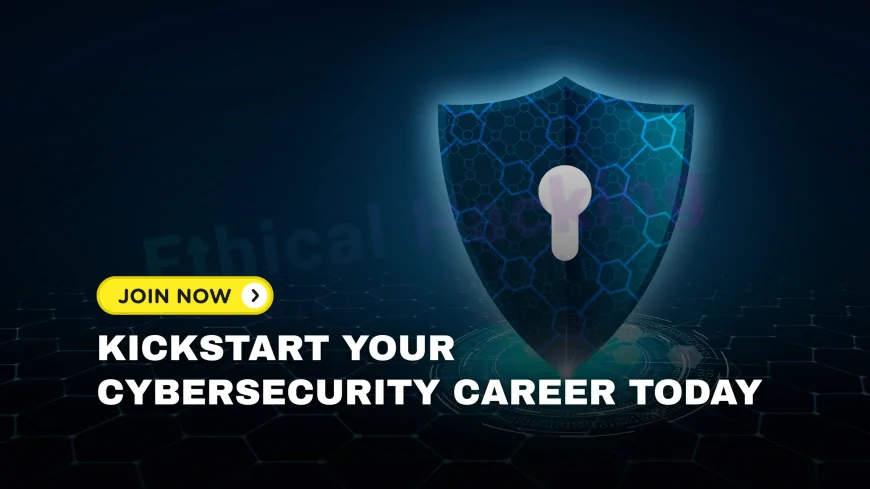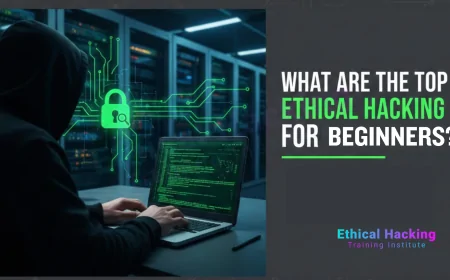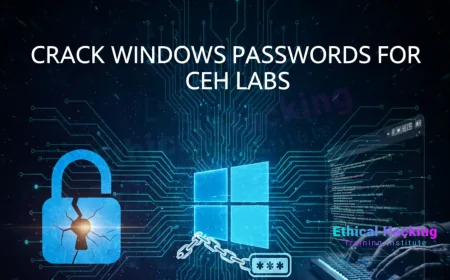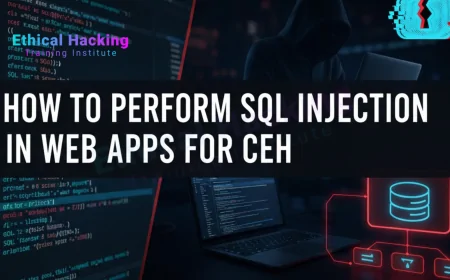Find the Best Ethical Hacker Courses Near You and Start Your Career Today | Start Your Cybersecurity Journey with the Best Local Ethical Hacking Courses
Discover the best ethical hacker courses near you! Explore top certifications like CEH and OSCP, compare costs, get career insights, and learn from industry experts. Start your cybersecurity career today

Table of Contents
- Introduction
- Why Ethical Hacking?
- Types of Certifications
- How to Choose a Course Near You
- Top Institutes & Platforms
- Costs & Durations
- Key Skills You’ll Gain
- Career Outlook & Salaries
- Courses in Pimpri‑Chinchwad & Maharashtra
- Tips for Success
- FAQs
- Conclusion
Introduction
In a world driven by digital innovation, cybersecurity stands at the forefront of global defense strategies. Among the guardians of digital ecosystems, ethical hackers—also known as penetration testers or “white‑hat” hackers—play a crucial role. They simulate real-world attack scenarios to identify and remediate security vulnerabilities before malicious actors exploit them.
But how do you start on this path? How can you find the best ethical hacking course near you—and within your budget? And how can you ensure the program you choose offers high-quality, hands-on learning, recognized certifications, and strong career support? This article answers all these questions (and more), helping you launch your ethical hacking career efficiently.
Why Ethical Hacking?
- High Demand: Businesses, governments, and NGOs worldwide seek skilled professionals to protect sensitive data and systems.
- Ethical Purpose: It’s a legal, responsible way to understand hacking techniques and fortify systems.
- Good Salary: In India, entry-level ethical hackers can earn INR 6–10 LPA, while experienced pros earn INR 15–30 LPA or more :contentReference[oaicite:1]{index=1}.
- Global Mobility: Certifications like CEH and OSCP are recognized worldwide.
Types of Certifications
- CEH (Certified Ethical Hacker) – EC‑Council’s flagship credential focused on tools & methods; exam is 125 MCQs over 4 hours :contentReference[oaicite:2]{index=2}.
- OSCP (Offensive Security Certified Professional) – Highly technical, hands-on, 24‑hour practical exam; teaches penetration with Kali Linux :contentReference[oaicite:3]{index=3}.
- Other certs: ECSA, GPEN, CISSP, CompTIA Security+ / PenTest+, CISSP, etc. :contentReference[oaicite:4]{index=4}.
- SANS Courses: SEC504, SEC560, SEC542, SEC660, and more — top‑tier training with GIAC certs :contentReference[oaicite:5]{index=5}.
How to Choose a Course Near You
- Certification Path: Beginner? CEH is a good start. Advancing? OSCP or SANS.
- Hands-On Labs: Check if they offer live environments, CTFs, challenge labs, etc.
- Trainer Experience: Look for instructors with real-world pen‑testing history.
- Placement Support: Resume prep, interview coaching, job placement—key at institutes like Boston Institute of Analytics :contentReference[oaicite:6]{index=6}.
- Mode & Flexibility: Choose between classroom, live‑online, or self‑paced learning.
- Cost Transparency: Ensure all fees (exam, labs, GST) are clear upfront.
Top Institutes & Platforms
Here's a curated list of respected training providers offering ethical hacking programs accessible in India:
• CEH Providers
- EC‑Council Official / ATCs: Globally recognised; focus on CEH v12 :contentReference[oaicite:7]{index=7}.
- Intellipaat: Online CEH with real‑world projects and corporate tie‑ups :contentReference[oaicite:8]{index=8}.
- Craw Security: Delhi‑based CEH v13 with 60 hours of training :contentReference[oaicite:9]{index=9}.
- Edu Eyrie India: Online CEH training with capstone projects, 24×7 support :contentReference[oaicite:10]{index=10}.
• OSCP & Advanced
- Offensive Security: Creator of OSCP; well‑known for Kali Linux and "Try Harder" philosophy :contentReference[oaicite:11]{index=11}.
- SANS Institute: Gold‑standard for comprehensive hands‑on pen‑testing and GIAC certs :contentReference[oaicite:12]{index=12}.
• Other Platforms
- Simplilearn: Self-paced CEH & Cybersecurity Expert programs :contentReference[oaicite:13]{index=13}.
- NIIT, Appin, WebAsha (Pune): Classroom and hybrid courses – good for local learners :contentReference[oaicite:14]{index=14}.
- Jetking Infotrain: CCNA + Ethical Hacking in multiple centres, including Maharashtra :contentReference[oaicite:15]{index=15}.
- NPTEL (Govt‑backed): Free video courses + ₹1,000 exam; IIT/IISc certification :contentReference[oaicite:16]{index=16}.
Costs & Durations
| Course | Duration | Cost |
|---|---|---|
| CEH (classroom/online) | 40–60 hrs | ₹30–45k |
| OSCP (PwK + exam) | 90 days lab access | From ₹1.5 lakh ($1,749) :contentReference[oaicite:17]{index=17} |
| SANS GIAC | 1–2 weeks intensive | ₹3–6 lakh |
| NPTEL Ethical Hacking | Self‑paced | Free + ₹1,000 exam :contentReference[oaicite:18]{index=18} |
Note: Look out for GST, lab fees, and retake charges that may apply.
Key Skills You’ll Gain
- Network scanning, enumeration, and vulnerability analysis
- System exploitation, privilege escalation, and post‑exploitation
- Web app hacking: SQLi, XSS, CSRF, file inclusion, etc.
- Wireless attacks, social engineering, phishing simulation
- Reverse engineering, malware analysis
- Reporting: Writing professional penetration test reports
Career Outlook & Salaries
Entry-level ethical hackers earn ₹6–10 LPA in India; mid-to-senior roles command ₹15–30 LPA, with experienced pentesters in top firms earning even higher :contentReference[oaicite:19]{index=19}. Globally, CEH and OSCP credentials significantly boost hiring potential.
Job roles to target include: Penetration Tester, Security Analyst, Red Team Specialist, and Vulnerability Assessor. With experience and advanced certs, you can rise to lead roles or consultancy positions.
Courses in Pimpri‑Chinchwad & Maharashtra
Since you’re in Pimpri‑Chinchwad (near Pimpri, Maharashtra), here are local options:
- WebAsha Technologies (Wadgaon Sheri, Pune): Offers CEH, Advanced Pentest; hands-on labs; local reputation :contentReference[oaicite:20]{index=20}.
Tips for Success
- Set clear goals: Decide if you're going for CEH, OSCP, or later CISSP.
- Lab environment: Use VirtualBox/Vmware + Kali Linux for hands-on practice.
- Join communities: Participate in local meetups, online forums (e.g. r/cybersecurityindia :contentReference[oaicite:24]{index=24}).
- CTF & Bug Bounty: Platforms like HackTheBox, Bugcrowd sharpen real‑world skills.
- Soft skills: Effective reporting, communication, and teamwork are essential in pen‑testing engagements.
- Keep learning: Stay updated on new vulnerabilities, tools, and exploits.
Frequently Asked Questions (FAQs)
1. What is an ethical hacking course?
An ethical hacking course teaches students how to legally test and secure computer systems by identifying vulnerabilities.
2. Who can take an ethical hacking course?
Anyone with a basic understanding of computers, networking, or cybersecurity can enroll—no prior hacking experience is required.
3. Is ethical hacking legal?
Yes, when done with permission and within legal boundaries, ethical hacking is completely legal and essential to cybersecurity.
4. What certifications are included in ethical hacking courses?
Popular certifications include CEH (Certified Ethical Hacker), CompTIA PenTest+, OSCP, and CHFI, depending on the course provider.
5. How long does an ethical hacking course take?
Courses typically range from 4 weeks to 6 months depending on the format (bootcamp, part-time, full-time, or self-paced).
6. Are there any prerequisites?
Most courses recommend basic networking knowledge, but beginner-friendly options are available that teach fundamentals from scratch.
7. Where can I find ethical hacking courses near me?
You can find them at local training institutes, universities, or online platforms offering location-based options and virtual learning.
8. Are online ethical hacking courses effective?
Yes, especially those that offer hands-on labs, simulations, and interactive tools like virtual machines or cloud environments.
9. How much does an ethical hacking course cost?
Prices vary—basic online courses may cost under ₹5,000, while certified programs like CEH can range from ₹50,000 to ₹1,50,000.
10. What skills will I learn in an ethical hacking course?
You'll learn scanning, enumeration, penetration testing, malware analysis, password cracking, social engineering, and more.
11. What jobs can I get after completing an ethical hacking course?
You can apply for roles such as ethical hacker, penetration tester, security analyst, SOC analyst, or vulnerability assessor.
12. Is ethical hacking a good career choice?
Yes, it's a high-demand career with excellent growth potential, especially with the rise in cyber threats across industries.
13. Do these courses provide certificates?
Reputable courses and training institutes offer certificates of completion or prep you for globally recognized certifications.
14. What is CEH and should I take it?
CEH (Certified Ethical Hacker) is a widely recognized certification by EC-Council, ideal for validating your ethical hacking skills.
15. Can I learn ethical hacking for free?
Yes, platforms like Cybrary, TryHackMe, and YouTube offer free beginner courses, though advanced certifications usually cost.
16. Do I need to know coding?
Basic scripting in Python or Bash is helpful but not mandatory for most beginner ethical hacking courses.
17. Will I get hands-on experience?
Good courses include labs and practical exercises that let you hack in simulated or sandbox environments safely.
18. What tools do ethical hackers use?
Popular tools include Nmap, Metasploit, Burp Suite, Wireshark, John the Ripper, SQLMap, and Kali Linux distributions.
19. Can I take an ethical hacking course while working?
Yes, many part-time, weekend, or self-paced online programs are ideal for working professionals.
20. What’s the future of ethical hacking?
Ethical hacking continues to grow with AI, IoT, and cloud adoption—offering job security and high salaries in cybersecurity.
Conclusion
Launching your career as an ethical hacker begins with the right training program. Whether you go for CEH to build foundations, pursue OSCP for hands‑on penetration testing, or invest in SANS for elite credentialing, the key is practical experience and continuous learning. For learners in Pimpri‑Chinchwad and throughout Maharashtra, local institutes like WebAsha, Jetking, NIIT, and Appin offer structured classroom programs, while reputable online providers like Intellipaat and NPTEL offer flexibility and value.
Map your path, invest in labs and community involvement, and aim for recognized certifications. You’ll soon be equipped to protect critical infrastructure, unveil hidden vulnerabilities, and build a rewarding career in cybersecurity.
What's Your Reaction?
 Like
0
Like
0
 Dislike
0
Dislike
0
 Love
0
Love
0
 Funny
0
Funny
0
 Angry
0
Angry
0
 Sad
0
Sad
0
 Wow
0
Wow
0


















